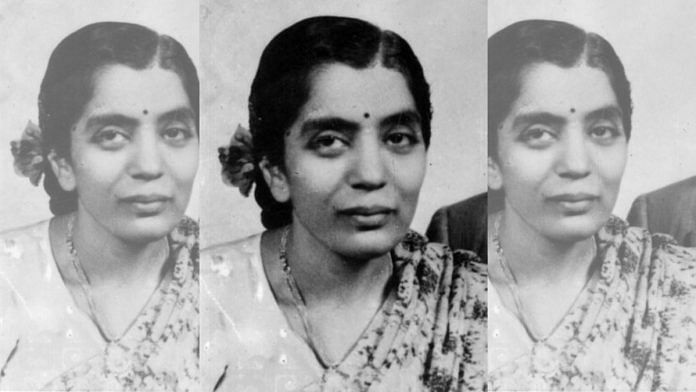New Delhi: Savita Bhimrao Ambedkar, also known as ‘Mai’ or ‘Maisaheb’, was a medical practitioner and the second wife of Dr Bhimrao Ramji Ambedkar, one of India’s most powerful social reformers and father of the Indian Constitution.
Savita was a close witness to his contributions in framing the Constitution. She was also present during his induction into Buddhism at Deekshabhoomi in Nagpur. In an unpublished preface to his last book The Buddha and His Dhamma, Ambedkar credited Savita and his personal doctor, Dr Malvankar, for nursing him back to health during the five years while he was writing the book.
Savita was, however, blamed for Ambedkar’s death in December 1956. There were conspiracy theories that she had poisoned Ambedkar with a glass of buttermilk or suffocated him with a pillow, said archivist Vijay Surwade, who has dedicated his life to collecting memorabillia concerning Ambedkar.
The rumours even prompted the government to launch an inquiry into Ambedkar’s death but the probe ruled out any foul play.
Many have also doubted her commitment to the Dalit-Buddhist movement because of her Brahmin roots, despite her converting to Buddhism along with Ambedkar.
A researcher and an Ambedkarite, Sadanand Fulzele, has said, “The people of Maharashtra had many misgivings about her, and think that she gave Babasaheb a slow poison. Once, (Ramdas) Athawale tried to bring her to the dais at a party event, but the people did not accept her.”
Fulzele added that those who took an extreme stance on Savita’s role were seen as more legitimate at the time, while those taking a more neutral view were believed as betraying the cause.
Savita died on 29 May 2003 at the J.J. Hospital in Mumbai after a prolonged illness. She was 94-year-old at the time of her death. Prime Minister Atal Bihari Vajpayee had expressed grief over her death, and called her Ambedkar’s “principal source of inspiration” and “a great social worker, in her own right”.
On her 112nd birth anniversary Wednesday, ThePrint takes a look at the woman who stood behind Ambedkar and the many ways in which she helped preserve his legacy.
Also read: Rani Gaidinliu, ‘daughter of the hills’ who spent 14 years in jail for India’s independence
Early life, letters to Ambedkar & marriage
Born on 27 January 1909, Savita hailed from Dorla village in Ratnagiri district of Maharashtra. Her maiden name was Sharda Kabir, which she later changed to Savita Ambedkar. Savita’s father was a registrar of the Indian Medical Council.
She completed her early education in Pune and obtained her MBBS degree from Grant Medical College, Mumbai in 1937. After briefly working as a chief medical officer at a hospital in Gujarat, she came to Mumbai where she met Ambedkar, who was suffering from diabetes and blood pressure at the time.
The two exchanged around 40-50 letters for a year after that. Ambedkar would pen letters that were 18-25 pages-long, said Surwade. In one of the letters to Savita in February 1948, Ambedkar had discussed the blurring of his private and public life. “You have not cared to inquire into my past,” he wrote. “But it will be available to you at any time in the pages of many Marathi magazines.”
The two married on 15 April 1948 in New Delhi, 13 years after the death of Amebdkar’s first wife, Ramabai.
Keeping Ambedkar’s legacy alive
After Ambedkar’s death, Savita spoke at many conferences and public events concerning the Dalit-Buddhist movement and contributed to the cause, Surwade said. She also introduced figures like former Union minister Chinta Mohan, who often speaks out against caste discrimination and the importance of upholding Ambedkar’s legacy, to politics.
Savita was instrumental in setting up the Symbiosis Society’s Dr Babasaheb Ambedkar Museum and Memorial in Pune that was inaugurated in 1996. In 1982, 26 years after Ambedkar’s death, she began donating many of his belongings for the construction of a museum by the Symbiosis Society.
Today, the museum preserves and displays many of the social reformer’s books and manuscripts, his violin, silver-framed spectacles, the Bharat Ratna medal and more. Until 2001, Savita visited the museum every year on Ambedkar’s birth and death anniversaries, said the director of the memorial.
It was also her and other extended members of his family who granted permission to the government for publication of Ambedkar’s complete writings. Savita was consulted during the making of a feature film on Ambedkar’s life that was directed by Jabbar Patel and released in 2000. Actor Mrinal Dev-Kulkarni, best known for her role in the popular TV serial Son Pari, played the role of Savita.
Also read: AIADMK founder MGR was also the first film actor to become a chief minister in India



